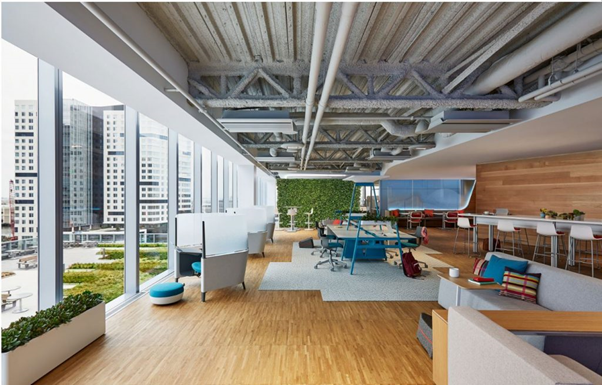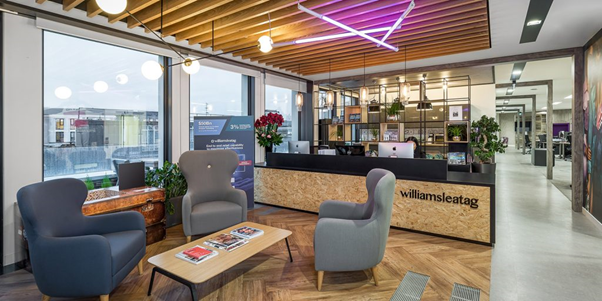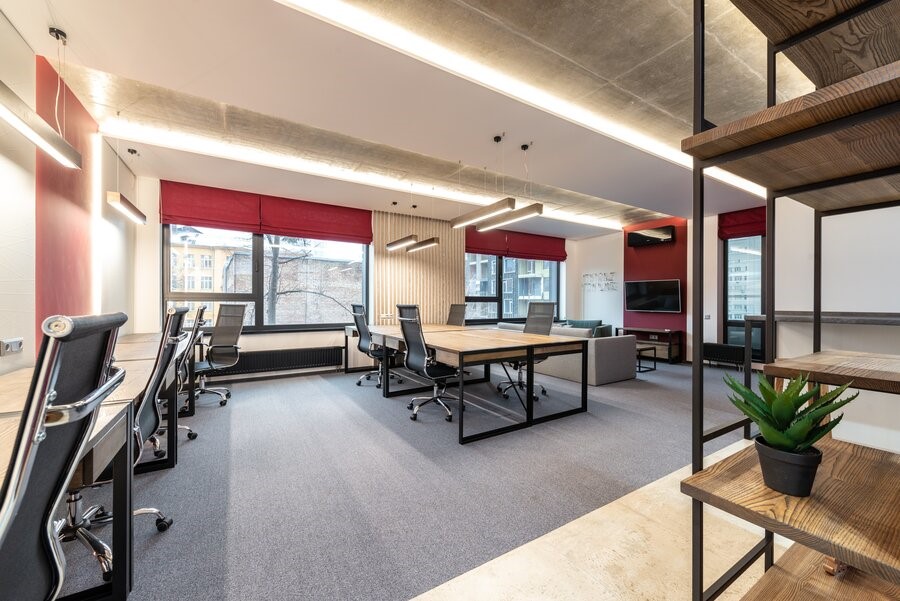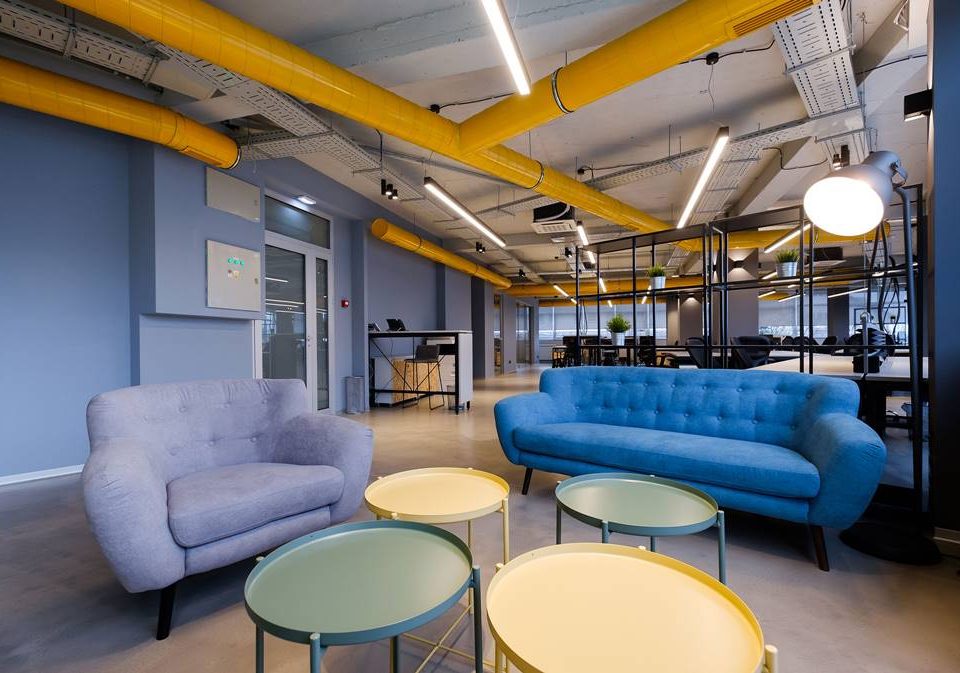Designing office spaces today is no easy task. Companies are becoming increasingly complex in terms of their functions and operations.
Those on the front lines of workplace design are working to anticipate the ever-evolving needs of businesses while creating a cohesive brand environment that embraces innovation and a company’s corporate culture and vision.
As is the nature of trends, they change with the times. Although some have more staying power, even the most popular trends evolve over time while others fizzle out entirely. What remains consistent about the trends of 2020 is that they are a reflection of our modern-day business culture. By looking at the trends of tomorrow, you can understand where the businesses are now and where they want to be when the future finally arrives.
In this article, you will discover the office design trends of tomorrow as defined by our team of expert design consultants. By working with thousands of major employers throughout North America, Our Hub’s design consultants see first hand what concepts are emerging, trending, and appear to be here to stay. Our Hub has identified four groupings of macro and micro trends that are driving office design trends today. As businesses continue to define their future plans, these dynamic trends offer opportunities in workplace improvements and design.
As we plan for 2020 and beyond, these trends stand to make the most immediate and significant impacts on the future of our workspaces.
MACRO TRENDS

Dynamic Flexibility A few years ago, the Dynamic Spaces trend began to emerge, introducing people to the idea of multi-functional workspaces. These spaces included indoor-outdoor access via garage doors, movable green dividers, television and video equipment, and step-style seating, to name a few. Basically, these spaces were designed to begin to meet the needs and applications of our increasingly multidisciplinary business world.
Since then, multi-purpose spaces have become the new normal, but nothing quite like this trend’s next phase: Dynamic Flexibility. It incorporates an entirely new generation of moveable, multi-functional, lightweight, and ergonomic elements designed to fit any space and purpose. Gone are the days when heavy, bulky furniture and technology dictated what could and could not be achieved in a space.
The Dynamic Flexibility design trend focuses on making the most out of valuable real estate. It allows for complete transformations of environments from meeting room to podcast studio, to production area, to a quiet, semi-private space in the blink of an eye. From movable walls and lightweight, mobile furniture, to adjustable lighting and technology, these spaces allow employees to transform rooms in an instant.
Why is it worth checking?
Key Features:
⬤ Furniture-forward ⬤ Lightweight ⬤ Moveable / Wheels ⬤ Ergonomic ⬤ Multifunctional

Wooden That Be Nice? Wood is making a comeback. Most office environments today are built using traditional whiteboard drywall construction and filled with metal cubicles. Millennials, now the largest labor force in the U.S., want assurance that the organization they work for aligns with their pro-environment and sustainability ideologies. One way property developers are responding is by incorporating sustainably sourced woodwork and natural accents details into their building’s interior designs.
Not only is wood being used for walls, floors, countertops, and accents, but it also provides a space with an undeniable character, adding biophilic texture, lines, and warmth to traditionally sterile office environments. Commercial designs have been progressing towards a more authentic and organic motif (but not rustic, as with former trends) as they focus on attracting top talent.
Features like prefabricated wood and glass offices, elaborately constructed wood and moss walls, coffee tables made from preserved tree stumps, and refined, reclaimed woods, are all popular additions to the new office space design.
Why is it worth checking?
Key Features:
⬤ Linear, slatted wood ⬤ Warm and textured ⬤ Structural and wall construction ⬤ • Natural accent details ⬤ Biomorphic forms and patterns

Community in a Remote World It’s no secret that we’re living in an increasingly digital world, and the business world is no exception. A recent study found that 70 percent of professionals now work remotely at least one day per week, and 53 percent work remotely for at least half of the week. That means companies need to reimagine and redesign their office spaces to meet their employee’s ever-changing needs and expectations, even in an increasingly remote world. In order to adapt, businesses are working with designers to create more inviting and comfortable spaces that promote a sense of community, comfortability, and shared values.
This trend is not simply a reactionary effort to keep people satisfied with the office environment, it’s an ongoing trend that has finally reached its natural pinnacle based on employee preferences and lifestyle needs.
The new office environment now includes features typically found in hospitality settings such as restaurants, bars or beer fridges, fireplaces and comfortable furniture, game rooms, rock walls, and fitness areas complete with showers and spas.
Why is it worth checking?
Key Features:
⬤ Collaborative environments ⬤ Warm and welcoming ⬤ Indoor-outdoor blurred transitions ⬤ • Soft and plush elements ⬤ Home-styled fixtures

Striking Sustainability As office environments continue their ongoing metamorphosis from sterile and impersonal to inspired and wellness-focused community spaces, a trend has emerged that everyone near-unanimously agrees is a good thing: sustainable design. At its roots, sustainable design is the integration of recycled, sustainably sourced, and green building materials into a space. It puts an emphasis on technology-driven energy efficiency, environmental conservation, and ecological compliance in order to establish a more harmonious relationship between nature and our buildings. When you take this concept indoors you get something entirely new called environmental wellness. Environmental wellness design isn’t necessarily new. Nevertheless, the design trend continues to evolve and mature exponentially as it grows and diversifies in new and exciting ways.
Sustainable design in its current form now has a whole spectrum of certifications in place to focus on the investment in our building’s performance as well as employee well-being. These include LEED, WELL Building Standard, FitWel, and the Living Building Challenge, which are all meant to create a positive impact on the occupants and natural systems that interact with buildings. What we’re witnessing now is the fully realized dream of wellness and environmental design.
Replacements with modern open space as a more modern option that you can find in our offer in the center of Belgrade, Makedonska 12.
Why is it worth checking?
Key Features:
⬤ Minimally processed materials ⬤ Natural woods and stone features ⬤ Highly designed green spaces ⬤ Workspace utilization technologies ⬤ Natural lighting







